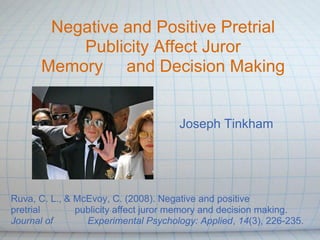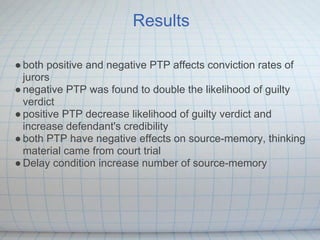Negative and positive pretrial publicity affect juror memory and
- 1. Negative and Positive Pretrial Publicity Affect Juror Memory and Decision Making Joseph Tinkham Ruva, C. L., & McEvoy, C. (2008). Negative and positive pretrial publicity affect juror memory and decision making. Journal of Experimental Psychology: Applied, 14(3), 226-235.
- 2. Background ŌŚÅ Past research has found that source memory can be easily influenced by misinformation ŌŚÅ Also research on the effects of negative PTP on juror verdicts and ability to discriminate source information ŌŚÅ Past research criticized for not mimicking normal cognitive strain of a real trial, lasting anywhere from hours to days ŌŚÅ Delay between when information is presented and retrieved found to increase the number of errors
- 3. cont. ŌŚÅ This study is thought to be the first to analyze the effects of positive PTP on juror's memory ŌŚÅ Predicted that positive PTP would have little effect because of past research on negativity bias (people pay more attention to negative information) ŌŚÅ Predicted that participants in the negative PTP condition were more likely to render a guilty verdict and misattribute source information from news article to court trial ŌŚÅ Also predicted that participants in the delay condition would have poorer source-memory
- 4. Method ŌŚÅ N=159 participants (11 drop out) ŌŚÅ Mean age = 19 years old ŌŚÅ Used various Likert Scales to measure: ŌŚŗ defendant's guilt ŌŚŗ source information and confidence ŌŚŗ various credibility characteristics of the defendant ŌŚŗ ratings of the attorney
- 5. Methods cont. ŌŚÅ Randomly assigned to 3 conditions of PTP (news article content): ŌŚŗ Positive (Pro-Defendant) ŌŚŗ Negative (Anti-Defendant) ŌŚŗ Neutral (Unrelated) ŌŚÅ 5 days after reading, come back to view videotape trial ŌŚÅ give preliminary decision of defendant's guilt ŌŚÅ Randomly assigned to 2 time conditions: ŌŚŗ Immediate - gave final verdict that session ŌŚŗ Delay - gave final verdict 2 days later
- 6. Results ŌŚÅ both positive and negative PTP affects conviction rates of jurors ŌŚÅ negative PTP was found to double the likelihood of guilty verdict ŌŚÅ positive PTP decrease likelihood of guilty verdict and increase defendant's credibility ŌŚÅ both PTP have negative effects on source-memory, thinking material came from court trial ŌŚÅ Delay condition increase number of source-memory
- 7. Critique ŌŚÅ Overall Good Design/measures ŌŚÅ Successfully built on previous research ŌŚÅ Fitting conclusions ŌŚÅ Applicable to American culture ŌŚÅ Lacks generalizability outside American culture ŌŚÅ Question design of neutral PTP condition
- 8. Discussion ŌŚÅ Do you think these results would affect the overall group jurors' decision? ŌŚÅ How would you expected court and publicity culture to influence results? ŌŚŗ e.g. Guilty until proven innocent...








